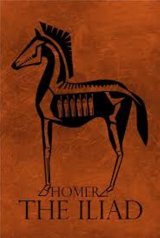Iliad Page #8
The Iliad is an ancient Greek epic poem in dactylic hexameter, traditionally attributed to Homer. Set during the Trojan War, the ten-year siege of the city of Troy (Ilium) by a coalition of Greek states, it tells of the battles and events during the weeks of a quarrel between King Agamemnon and the warrior Achilles.
The doubling clamours echo to the skies. E'en then the Greeks had left the hostile plain, And fate decreed the fall of Troy in vain; But Jove's imperial queen their flight survey'd, And sighing thus bespoke the blue-eyed maid: "Shall then the Grecians fly! O dire disgrace! And leave unpunish'd this perfidious race? Shall Troy, shall Priam, and the adulterous spouse, In peace enjoy the fruits of broken vows? And bravest chiefs, in Helen's quarrel slain, Lie unrevenged on yon detested plain? No: let my Greeks, unmoved by vain alarms, Once more refulgent shine in brazen arms. Haste, goddess, haste! the flying host detain, Nor let one sail be hoisted on the main." Pallas obeys, and from Olympus' height Swift to the ships precipitates her flight. Ulysses, first in public cares, she found, For prudent counsel like the gods renown'd: Oppress'd with generous grief the hero stood, Nor drew his sable vessels to the flood. "And is it thus, divine Laertes' son, Thus fly the Greeks (the martial maid begun), Thus to their country bear their own disgrace, And fame eternal leave to Priam's race? Shall beauteous Helen still remain unfreed, Still unrevenged, a thousand heroes bleed! Haste, generous Ithacus! prevent the shame, Recall your armies, and your chiefs reclaim. Your own resistless eloquence employ, And to the immortals trust the fall of Troy." The voice divine confess'd the warlike maid, Ulysses heard, nor uninspired obey'd: Then meeting first Atrides, from his hand Received the imperial sceptre of command. Thus graced, attention and respect to gain, He runs, he flies through all the Grecian train; Each prince of name, or chief in arms approved, He fired with praise, or with persuasion moved. "Warriors like you, with strength and wisdom bless'd, By brave examples should confirm the rest. The monarch's will not yet reveal'd appears; He tries our courage, but resents our fears. The unwary Greeks his fury may provoke; Not thus the king in secret council spoke. Jove loves our chief, from Jove his honour springs, Beware! for dreadful is the wrath of kings." But if a clamorous vile plebeian rose, Him with reproof he check'd or tamed with blows. "Be still, thou slave, and to thy betters yield; Unknown alike in council and in field! Ye gods, what dastards would our host command! Swept to the war, the lumber of a land. Be silent, wretch, and think not here allow'd That worst of tyrants, an usurping crowd. To one sole monarch Jove commits the sway; His are the laws, and him let all obey."(86) With words like these the troops Ulysses ruled, The loudest silenced, and the fiercest cool'd. Back to the assembly roll the thronging train, Desert the ships, and pour upon the plain. Murmuring they move, as when old ocean roars, And heaves huge surges to the trembling shores; The groaning banks are burst with bellowing sound, The rocks remurmur and the deeps rebound. At length the tumult sinks, the noises cease, And a still silence lulls the camp to peace. Thersites only clamour'd in the throng, Loquacious, loud, and turbulent of tongue: Awed by no shame, by no respect controll'd, In scandal busy, in reproaches bold: With witty malice studious to defame, Scorn all his joy, and laughter all his aim:-- But chief he gloried with licentious style To lash the great, and monarchs to revile. His figure such as might his soul proclaim; One eye was blinking, and one leg was lame: His mountain shoulders half his breast o'erspread, Thin hairs bestrew'd his long misshapen head. Spleen to mankind his envious heart possess'd, And much he hated all, but most the best: Ulysses or Achilles still his theme; But royal scandal his delight supreme, Long had he lived the scorn of every Greek, Vex'd when he spoke, yet still they heard him speak. Sharp was his voice; which in the shrillest tone, Thus with injurious taunts attack'd the throne. "Amidst the glories of so bright a reign, What moves the great Atrides to complain? 'Tis thine whate'er the warrior's breast inflames, The golden spoil, and thine the lovely dames. With all the wealth our wars and blood bestow, Thy tents are crowded and thy chests o'erflow. Thus at full ease in heaps of riches roll'd, What grieves the monarch? Is it thirst of gold? Say, shall we march with our unconquer'd powers (The Greeks and I) to Ilion's hostile towers, And bring the race of royal bastards here, For Troy to ransom at a price too dear? But safer plunder thy own host supplies; Say, wouldst thou seize some valiant leader's prize? Or, if thy heart to generous love be led, Some captive fair, to bless thy kingly bed? Whate'er our master craves submit we must, Plagued with his pride, or punish'd for his lust. Oh women of Achaia; men no more! Hence let us fly, and let him waste his store In loves and pleasures on the Phrygian shore. We may be wanted on some busy day, When Hector comes: so great Achilles may: From him he forced the prize we jointly gave, From him, the fierce, the fearless, and the brave: And durst he, as he ought, resent that wrong, This mighty tyrant were no tyrant long." Fierce from his seat at this Ulysses springs,(87) In generous vengeance of the king of kings. With indignation sparkling in his eyes, He views the wretch, and sternly thus replies: "Peace, factious monster, born to vex the state, With wrangling talents form'd for foul debate: Curb that impetuous tongue, nor rashly vain, And singly mad, asperse the sovereign reign. Have we not known thee, slave! of all our host, The man who acts the least, upbraids the most? Think not the Greeks to shameful flight to bring, Nor let those lips profane the name of king. For our return we trust the heavenly powers; Be that their care; to fight like men be ours. But grant the host with wealth the general load, Except detraction, what hast thou bestow'd? Suppose some hero should his spoils resign, Art thou that hero, could those spoils be thine? Gods! let me perish on this hateful shore, And let these eyes behold my son no more; If, on thy next offence, this hand forbear To strip those arms thou ill deserv'st to wear, Expel the council where our princes meet, And send thee scourged and howling through the fleet." He said, and cowering as the dastard bends, The weighty sceptre on his bank descends.(88) On the round bunch the bloody tumours rise: The tears spring starting from his haggard eyes; Trembling he sat, and shrunk in abject fears, From his vile visage wiped the scalding tears; While to his neighbour each express'd his thought: "Ye gods! what wonders has Ulysses wrought! What fruits his conduct and his courage yield! Great in the council, glorious in the field. Generous he rises in the crown's defence, To curb the factious tongue of insolence,
Translation
Translate and read this book in other languages:
Select another language:
- - Select -
- 简体中文 (Chinese - Simplified)
- 繁體中文 (Chinese - Traditional)
- Español (Spanish)
- Esperanto (Esperanto)
- 日本語 (Japanese)
- Português (Portuguese)
- Deutsch (German)
- العربية (Arabic)
- Français (French)
- Русский (Russian)
- ಕನ್ನಡ (Kannada)
- 한국어 (Korean)
- עברית (Hebrew)
- Gaeilge (Irish)
- Українська (Ukrainian)
- اردو (Urdu)
- Magyar (Hungarian)
- मानक हिन्दी (Hindi)
- Indonesia (Indonesian)
- Italiano (Italian)
- தமிழ் (Tamil)
- Türkçe (Turkish)
- తెలుగు (Telugu)
- ภาษาไทย (Thai)
- Tiếng Việt (Vietnamese)
- Čeština (Czech)
- Polski (Polish)
- Bahasa Indonesia (Indonesian)
- Românește (Romanian)
- Nederlands (Dutch)
- Ελληνικά (Greek)
- Latinum (Latin)
- Svenska (Swedish)
- Dansk (Danish)
- Suomi (Finnish)
- فارسی (Persian)
- ייִדיש (Yiddish)
- հայերեն (Armenian)
- Norsk (Norwegian)
- English (English)
Citation
Use the citation below to add this book to your bibliography:
Style:MLAChicagoAPA
"Iliad Books." Literature.com. STANDS4 LLC, 2025. Web. 22 Jan. 2025. <https://www.literature.com/book/iliad_28>.




Discuss this Iliad book with the community:
Report Comment
We're doing our best to make sure our content is useful, accurate and safe.
If by any chance you spot an inappropriate comment while navigating through our website please use this form to let us know, and we'll take care of it shortly.
Attachment
You need to be logged in to favorite.
Log In